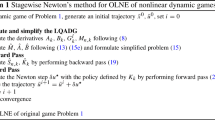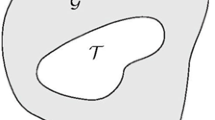Abstract
We present a numerical method for computing a local Nash (saddle-point) solution to a zero-sum differential game for a nonlinear system. Given a solution estimate to the game, we define a subproblem, which is obtained from the original problem by linearizing its system dynamics around the solution estimate and expanding its payoff function to quadratic terms around the same solution estimate. We then apply the standard Riccati equation method to the linear-quadratic subproblem and compute its saddle solution. We then update the current solution estimate by adding the computed saddle solution of the subproblem multiplied by a small positive constant (a step size) to the current solution estimate for the original game. We repeat this process and successively generate better solution estimates. Our applications of this sequential method to air combat simulations demonstrate experimentally that the solution estimates converge to a local Nash (saddle) solution of the original game.
Similar content being viewed by others
References
B. Anderson and J.B. Moore, Optimal Control. Prentice-Hall, Englewood Cliffs, NJ, 1989.
M. Bardi, T.E.S. Raghavan, T. Parthasarathy (Eds.), Stochastic and Differential Games: Theory and Numerical Methods, Birkhauser, Boston, 1999.
T. Basar and G.J. Olsder, Dynamic Noncooperative Game Theory, 2nd ed., Academic Press: New York, NY, 1995.
J. Bracken (Ed.), Warfare Modeling, Military Operations Research Society, 1995.
A.E. Bryson, Jr. and Y.C. Ho, Applied Optimal Control, Blaisdell Pub. Co.: Waltham, Mass., 1969.
N.T. Dupuy, Attrition: Forecasting Battle Casualities and Equipment Losses in Modern War. Hero Books: Fairfax, VA, 1990.
A. Friedman, Differential Games. John Wiley: New York, 1971.
R. Isaacs, Differential Games. John Wiley: New York, 1965.
H.W. Knobloch, A. Isidori, and D. Flockerzi, Topics in Control Theory, Birkhauser Verlag, Basel, 1993.
A. Kott, L. Ground, and J. Langston, “Estimation of battlefield attrition in a course of action analysis decision support system,” presented at the Military Operations Research SocietyWorkshop on Land and Expeditionary Warfare, June, 1999.
E.B. Lee and L. Marcus, Foundations of Optimal Control Theory. John Wiley, New York, NY, 1967.
J. Lewin, Differential Games: Theory and Methods for Solving Game Problems with Singular Surfaces. Springer-Verlag, New York, 1994.
D.G. Luenberger, Optimization by Vector Space Method, John Wiley, New York, NY, 1969.
H. Mukai et al., “Game-theoretic linear-quadratic method for air mission control,” in Proc. 39th IEEE Conf. Decision and Control, pp. 2574-2580, Sydney, Australia, Dec. 2000.
H. Mukai, A. Tanikawa, P. Rinaldi, and I. Tunay, “Sequential guadratic methods for differential games,” Pro. American Control Conf., pp. 182-189, Washington, DC, June 2001.
Naval Institute Press, Chapter on Search and Patrol for the Probability of Detection,Naval Operations Research, 2nd ed., Naval Institute Press, 1977.
J.G. Taylor, Force-on-force Attrition Modelling. Military Operations Research Society, 1980.
I. Tunay, J. Goodwin, and H. Mukai, “Markov chain combat models for attrition prediction and mission control,” p. 15, 3rd Int'l Meeting of INFORMS Military Applications Society (3MAS), San Antonio, Texas, Nov. 2000.
Author information
Authors and Affiliations
Rights and permissions
About this article
Cite this article
Mukai, H., Tanikawa, A., Tunay, İ. et al. Sequential Linear-Quadratic Method for Differential Games with Air Combat Applications. Computational Optimization and Applications 25, 193–222 (2003). https://doi.org/10.1023/A:1022957123924
Issue Date:
DOI: https://doi.org/10.1023/A:1022957123924




